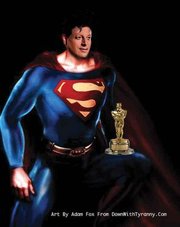Following is the essay you can designate as Volume 10, Number 41 of
This Week’s Clue, based on the e-mail newsletter I have produced since
March, 1997. It would be the issue of October 15.
Enjoy.
Stay the course has become a politically unpopular thing to say, because of Iraq, but it is good advice nonetheless.
This is best illustrated by the career of one Al Gore.
While most Democrats continue to believe the 2000 election was stolen from Mr. Gore (and it was) the fact is he took a different lesson from that experience. He learned from it that he must stay his own course.
By that time Gore had been letting himself be compromised for 12 years, ever since he first got the Presidential bug. Back then, in 1988, he ran to the right in the primaries, despite the fact that he was already a practicing futurist, whose legislative interests in the Internet were well-known in Washington, and whose environmental studies were also well-known.
Gore went through many changes, if you looked at him from the outside. He became a generational candidate alongside Bill Clinton. He became a loyal subordinate, even during Clinton’s turn to the right after 1994, and the Lewinsky mess. By the year 2000 he was bound by consultants and advisers like Gulliver among the Lilliputians, and his loss — whatever the cause — proved liberating.
It was only after Al Gore returned to being himself that he grew in stature. He spoke out early and often concerning Iraq. He continued his work on the environment. He stayed his course, and has now been rewarded. Whatever you may think of his electoral prospects the fact is he now towers over the Democratic field in ways Bill Clinton does not.
Gore has become the true father of the next political era, which I call the Internet Era, defined by the Internet as a medium and the Internet values of connectivity, openness and transparency. Clinton was a transactional leader. Gore is a transformational one. And the greatest political transformations occur outside the White House.
Gore’s lesson does not always lead to continuous success. Businesses which stay the course of their founders can come a-cropper when the environment changes. The history of business is littered with examples. The force of will which drives a successful business must be that of one man or one woman, and that person must remain true to their course in order to succeed, but what happens when they are taken from the scene, or when their own course fails them?
The struggle of businesses to become institutions, and to remain
institutions, is all about finding this inspiration, following this
inspiration, and about the search for new inspiration.
IBM did it with Lou
Gerstner — can Microsoft?
Over my own career I have faced a similar challenge to stay the
course. I’m at my best with short-form essays, with news, with stories
which have a defined beginning, middle and end. I don’t do the long
form well. I find books difficult, unless I have a definite outline,
and can find successive, concentrated doses of inspiration in each
chapter I write.
Yet writers are defined by books, not blogs. I struggled with this
for some time and finally decided, fairly recently, to heck with it. I
surrendered to my nature as a writer, found short-form work that, paid
or not, satisfied my personal needs of expression, and I’m staying the
course. Where that course is headed, in a business or professional
sense, I really can’t say. But I will say that since I renewed my
commitment to this short form work my income has risen, and I’m
happier, driven every day by that day’s challenges, determined to
succeed on my own terms.
Finding your course is the first great struggle of life, and it’s
one my kids have now embarked upon. I have seen from their example that
it’s the struggle which is defining, the challenges, the failures, and
the willingness to persevere. Neither has yet decided what to do with
their lives, not firmly, but both work hard, and I think that’s more
important.
Around the turn of this century I spent a lot of time among
"opportunity seekers," people seeking inspiration and wealth in the
words of one Jay Abraham (above).
Jay is a tremendous individual, with a real passion for what he’s
trying to do, namely inspire success, but I found the people who
followed him sort of sad. Some would spend thousands of dollars to
attend one of his seminars, then spend it again, and again. They looked
to him for inspiration, even when he was telling them they must find it
within themselves.
So the lesson of this Clue is something I find frustrating. Finding
a course, finding inspiration on that course, and sticking to that
course despite obstacles, even despite failure (as in my case) is very
easy to say, and very, very tough to do.
But it’s the only way to true success. Those who’ve found it, whether inside as in my case or outside, all attest to that.















Staying the course, like everything, is only good in moderation. Push it too far and you end up stuck in quagmires like Iraq and Vietnam. I think what you are really talking about is not staying the course, but being true to your own nature. This is a very powerful lesson and one I have never found to be wrong. It is best exemplified by the famous fable of the the frog and scorpion.
One day a scorpion called out to a frog swimming on the edge of a stream. “Give me a ride across,” begged the scorpion. “No way,” said the frog, “you’ll just sting me if I get close.” “No I won’t,” said the scorpion, “if I did that I’d never get across the river.” So the frog, being kindhearted, gave the scorpion a ride. When they were halfway across, the scorpion stung the frog and they started to sink. “Why’d you do that?” asked the frog. “Now we’re both going to drown.” “Hey,” replied the scorpion, “you can’t fight your nature!”
Staying the course, like everything, is only good in moderation. Push it too far and you end up stuck in quagmires like Iraq and Vietnam. I think what you are really talking about is not staying the course, but being true to your own nature. This is a very powerful lesson and one I have never found to be wrong. It is best exemplified by the famous fable of the the frog and scorpion.
One day a scorpion called out to a frog swimming on the edge of a stream. “Give me a ride across,” begged the scorpion. “No way,” said the frog, “you’ll just sting me if I get close.” “No I won’t,” said the scorpion, “if I did that I’d never get across the river.” So the frog, being kindhearted, gave the scorpion a ride. When they were halfway across, the scorpion stung the frog and they started to sink. “Why’d you do that?” asked the frog. “Now we’re both going to drown.” “Hey,” replied the scorpion, “you can’t fight your nature!”